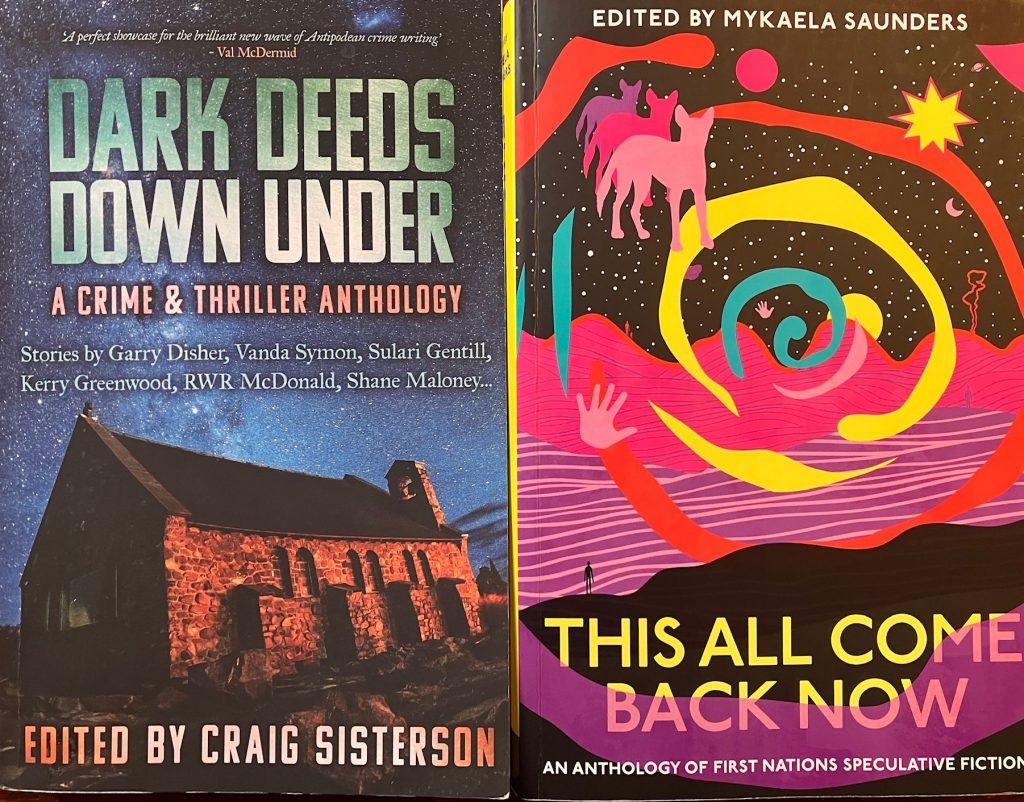Is it just me or is there definitely a renewed local interest in short story collections? There seems to be a few more of them being published than is normally the case and I am particularly interested in two that have come across my radar: Dark Deeds Down Under, an anthology of crime fiction edited by Craig Sisterson and This All Come Back Now, a new anthology of first nations speculative fiction, edited by Mykaela Saunders.
First up, Dark Deeds Down Under. The interesting selling point of this book is that it contains 19 crime fiction stories from Australian and New Zealand authors, some well-known, others not so much. As is the case with every anthology not every tale did it for me but there were far more hits than misses, which is unusual. I just want to briefly note the highlights in the collection for me.
Aoife Clifford’s ‘Summer of the Seventeenth Poll’ felt very much in the spirit of TV shows such as In the Thick of It, in its depiction of a political spinner who job sees them stumble across a murder, and the story has a real sting in the tail. No surprises that ‘The Cook’ by possibly my favourite Australian crime writer, David Whish-Wilson, was a terrific yarn about an ex-con speed cook and the troubled relationship he has with his son. Garry Disher’s short, ‘Sinner Man’, featuring his rural police character Hirsch, was also excellent. ‘The Falls’ by Lisa Fuller, an author I had not heard of before, the story of a white man investigating an Indigenous death in a remote Queensland town, was another highlight, combining a taunt crime tale with a deftly executed supernatural twist.
I have to confess that all the New Zealand contributors in Dark Deeds were new to me and there were two standouts The first was Nikki Crutchley’s ‘Save Me’, which starts as off as a story about family violence and gradually morphs into something much darker. The second, Stephen Ross’s ‘Mr Pig’, was a delightfully bent piece of World War II era New Zealand gothic about a young girl’s life on a remote farm and her relationship with a pig.
The great thing about crime fiction anthologies – anthologies of any kind, really – is that each reader will have their own favourites in terms of the line-up on offer. Local crime fiction anthologies are rare as, so the publisher behind Dark Deeds, Australian genre specialists Clandestine Press, are to be congratulated for putting the book together and I hope they do more in the future. Go out and buy it.
I came across This All Come Back Now in the process of preparing for a science fiction themed panel I was part of at the recent Port Fairy Literary weekend, that included the book’s editor Mykaela Saunders. I think I am correct in writing that the book is the first collection of First Nations science/speculative fiction to be put together in Australia.
The collection contains new writing and excerpts of stories that have appeared earlier by First Nations authors. I am still working my way through the book but in terms of the new material, the stand outs for me so far are Kalem Murray’s sci fic/horror mash-up ‘In His Father’s Footsteps’, Loki Liddle’s ‘Snake of Light’ and the post-apocalyptic stories by Saunders, ‘Terranora’, and journalist and author Jack Latimore, ‘Old Uncle Sir’. I particularly appreciated the book’s excavation of older First Nations science fiction. This included an excerpt from Samuel William Watson’s 1990 novel The Kadaitcha Sung, and Archie Weller’s 1998 book, Land of the Golden Clouds. I was familiar with Weller through reading his first novel The Day of the Dog, but I did not know he wrote spec fiction. The Watson novel is completely new to me. I loved the excerpt of it in This All Come Back Now and pretty much as soon as I had finished it, raced to the Internet to find a copy of the original novel (which I did).
Saunders she made two really crucial arguments in the Port Fairy panel. The first was to highlight the short shrift that First Nations people have received in Australian science fiction written to date by nearly white authors, hence the importance of anthologies like This All Come Back Now. The second is that what is seen as the meat of so much science fiction – post-apocalyptic scenarios, dystopia, the destruction of the climate and environment – are for First Nations peoples not a speculative future but the daily reality they face right now. I will be bearing both points in mind, not only as I complete the stories in This All Come Back Now, but in any future work I do in the area of science fiction.





















Pingback: My cultural highlights of 2022 | Pulp Curry